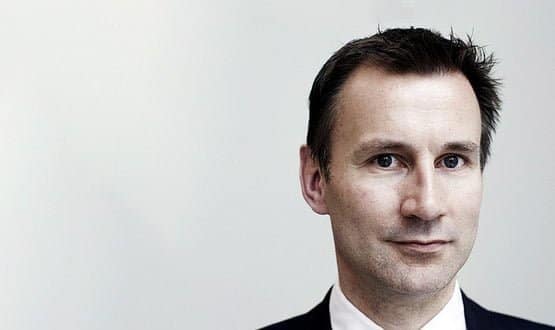Hunt’s pet project – Skyping GPs
- 6 June 2014

Health secretary Jeremy Hunt has urged the NHS to “put its head above the parapet” and make more creative use of technology in a speech to the NHS Confederation.
At the end of a positive speech, in which he praised the NHS for delivering increased activity on “only a very small” increase in budget, and said he was convinced that a “sustainable” NHS, “true to its values” could be delivered, Hunt was challenged on innovation.
A delegate from Moorfields Eye Hospital, where the openeyes electronic patient record is being developed, said the health service needed “disruptive technology” and asked how Hunt would support this, even if some ideas failed.
Hunt said that as someone who had run an IT business for 14 years – Hot Courses – he understood about risk and failure. And he outlined some initiatives he had seen where the NHS is making innovative use of technology.
He said his “pet idea” at the moment is for GPs to be able to Skype hospital consultants before a referral, to check that the referral is appropriate, and to learn more about the condition.
However, he said the “worst thing” he could do would be to write a Skype requirement into a new GP contract “and to try and force all 8,000 GPs out there to do it.” Instead, he said he wanted to “encourage people to put their head above the parapet” and try new things.
Hunt made several other references to technology in his keynote presentation to annual conference in Liverpool, in which he argued that the key to a sustainable NHS would be acting on the Francis report into the Mid Staffs scandal and revolutionising out of hospital care.
He argued that the health service needs to act on Francis, because poor quality is expensive; clinical negligence claims now cost the NHS £1.3 billion a year, while infections and never events cost it £800,000 a year.
The health secretary also drew attention to the work of Sir Bruce Keogh and other heart surgeons who published their data following the Bristol Royal Infirmary scandal, and argued that this had reduced mortality following surgery, through peer pressure.
He reiterated that the government will publish information about a further 13 hospital specialties this autumn.
On the subject of changing out of hospital care, Hunt talked about the importance of integrating health and social care, and the Better Care Fund to support integrated care initiatives.
The fund has £4 billion, mostly drawn from the NHS, but has reportedly been “paused” by the Cabinet Office, which wants to see more evidence that it will reduce pressure on A&E departments and deliver what is promised for it.
Hunt said fund money will only be released under certain conditions, which include risk sharing between the organisations accessing it, seven day working, and the creation of shared records.
Integrated care has been the big theme of political speeches at the conference.
Lib Dem care minister Norman Lamb calling for a radical move to share health and social care budgets to be included in his party’s general election manifesto.
And shadow health secretary Andy Burnham saying that joint services and joint budgets should be the goal over time.
Read a full analysis of the big ideas at this year's NHS Confederation conference in Insight.




